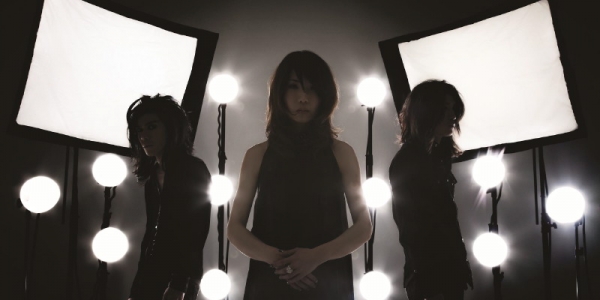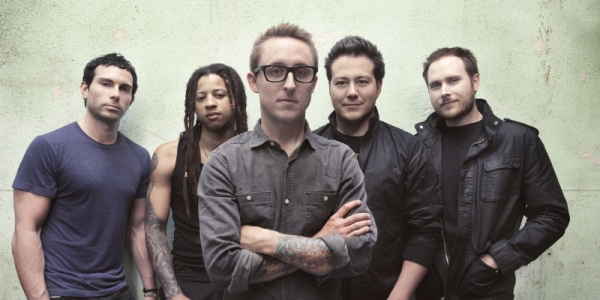Sure, the word “iconoclastic” tends to get bandied about quite a bit – but in Boris’s case that description is apt. Take their third album, 2000’s Flood. Consisting of a single track spread out over 72 minutes in four parts, Flood is a modern-day masterpiece of experimental droneadelica that celebrates noise, restraint, silence, and heaviness in equal measures. These three musicians – Takeshi on bass, Wata on guitar, and Atsuo on drums – deliver the goods … and then some.
“Our sound was similar to – and often overlapped – the hardcore/punk scene,” explains Atsuo by email when asked about their beginnings. “I guess you could call it the Tokyo Underground! Since we were that kind of band, we never really fitted neatly into any specific scene. Takeshi and I were in a Chaos UK tribute band, and we had lots of hardcore friends, so Boris was active amidst all those connections. For our own shows, we invited our favourite bands and helped organise events. We played with lots of different bands from many genres, such as punk, hardcore, psyche, alternative, garage, et cetera! I think spending time with all those bands and influences has been reflected in our music,” he concludes thoughtfully.
And it would be those wildly disparate influences, it seems, that flit about effortlessly, colouring their compositions in nearly equal measure. A Boris album (my personal favourite, 2005’s Pink, is a perfect example) doesn’t sit comfortably in one place. Their songs are like organic, living things that somehow sound different on separate listens. Is this shifting course they take intentional? Or does it just happen naturally?
“We don’t try to experiment in a conscious sense,” Atsuo answers. W”e don’t think it out beforehand. We only think about how we can make our listeners or our audience enjoy what we’re doing! We always look for something new because we get bored easily. We constantly follow our own gratification, but at the same time we have to deliver to the listeners what makes us feel hot – otherwise it isn’t honest!”
It’s only been since last year that saw Boris visiting Australia to tour – but this time will see them performing Flood in its entirety on stage. When asked what inspired this classic record, Atsuo is poetically vague.
“I think Parts Two and Three were completed during rehearsals,” he begins. “But we worked on and created Parts One and Four in the studio. To make this album, the concept was ‘an album that makes you sleep while you listen’, so I remember we extended the length of some parts until it was tedious, or we gradually blurred the original point of the sound.”
But, Atsuo informs, it’s not going to be just about Flood. “We’ll perform other songs as well,” he says. “We’ll also play new songs that haven’t been released yet! We can deliver a range of songs from Boris’s past and future, directly to the audience’s body. I hope they can experience the whole image of Boris, not just Flood.”
I ask him about Tokyo itself. What’s the musical scene there like? And is it supportive of burgeoning artists? The answer sounds a bit dystopic in a weird sense, but it also seems to illustrate a damn good reason to heading abroad to make one’s music.
“There are about 300 music venues called ‘live houses’ in the centre of Tokyo alone,” Atsuo explains. “These venues have everything you’ll need to play, all set up and prepared for you – even amps and a drum kit! Bands that play at these venues have to sell a minimum number of tickets or else they must pay the difference back to the venue.
“In Japan, this is called the ‘ticket norm’ quota system. Because this system has been established for a long time, Japanese bands are just exploited until they’re exhausted. As far as being the right place to give birth to new expressions, this system is unsound. I feel compelled to say that this situation is generally negative! There are some good venues, and some people are trying hard. But, I think they should go abroad more and more!”
Over the course of their career, Boris has collaborated with an abundance of fellow musos, such as Merzbow, Sunn 0))), Ian Astbury of The Cult, and Michio Kurihara of Ghost. Atsuo scoffs when asked if there is anybody they haven’t worked with that they’d like to in the future. “You shouldn’t give voice to such a thing,” he chides gently. “We have a word called ‘en’ in Japanese, which means something like ‘every encounter is the result of chance’.”
Regardless of whether they work with someone else or their own bad selves, Boris will certainly continue to create dazzling soundscapes that are quite unlike anything else. Atsuo is really keen to get back to Australia to share this momentous work of theirs.
“When we tour, we feel a deep connection with many people all over the world, and so we receive a massive boost!” he confides. “We always appreciate our fans and they make us feel like we are alive! We are looking forward to seeing you in Australia! Let’s enjoy our time together.”
BY THOMAS BAILEY

